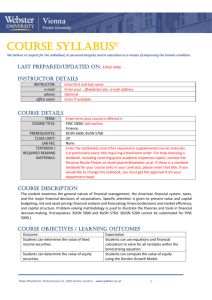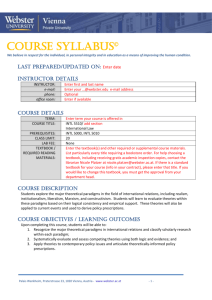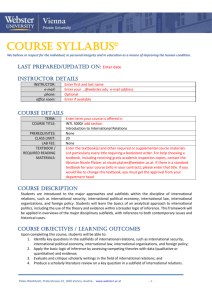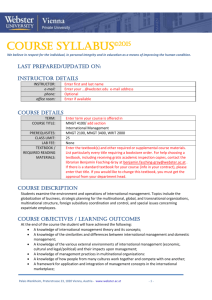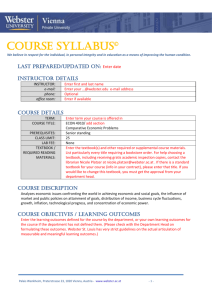course syllabus ©2015 - Webster University Vienna
advertisement
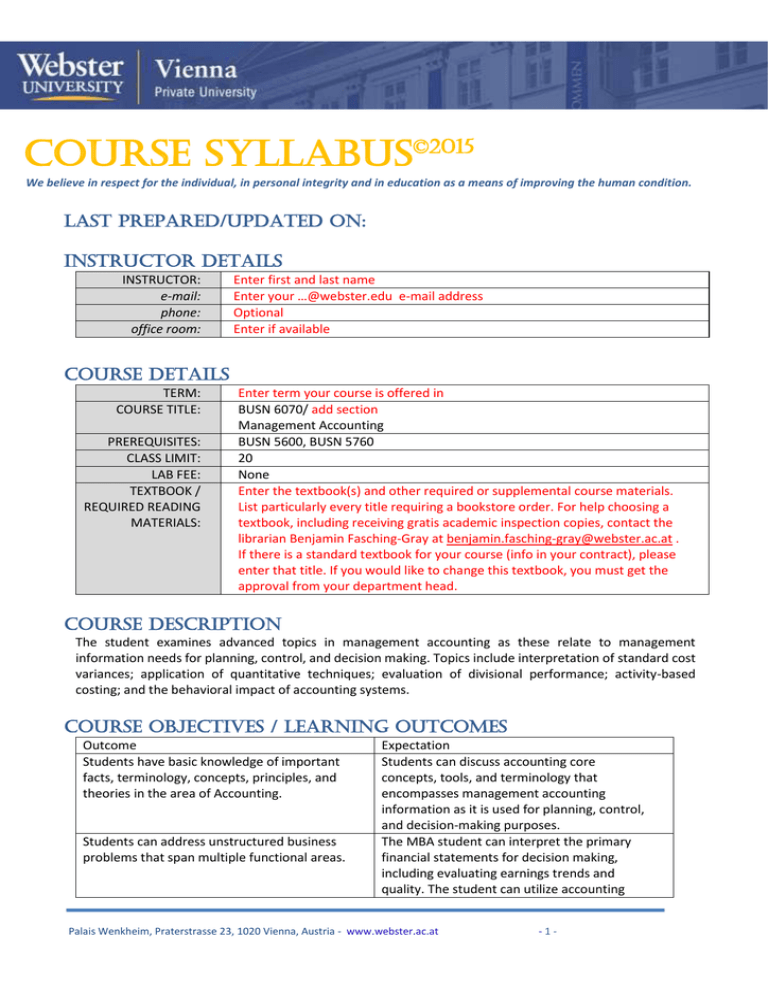
COURSE SYLLABUS©2015 We believe in respect for the individual, in personal integrity and in education as a means of improving the human condition. LAST PREPARED/UPDATED ON: INSTRUCTOR DETAILS INSTRUCTOR: e-mail: phone: office room: Enter first and last name Enter your …@webster.edu e-mail address Optional Enter if available COURSE DETAILS TERM: COURSE TITLE: PREREQUISITES: CLASS LIMIT: LAB FEE: TEXTBOOK / REQUIRED READING MATERIALS: Enter term your course is offered in BUSN 6070/ add section Management Accounting BUSN 5600, BUSN 5760 20 None Enter the textbook(s) and other required or supplemental course materials. List particularly every title requiring a bookstore order. For help choosing a textbook, including receiving gratis academic inspection copies, contact the librarian Benjamin Fasching-Gray at benjamin.fasching-gray@webster.ac.at . If there is a standard textbook for your course (info in your contract), please enter that title. If you would like to change this textbook, you must get the approval from your department head. COURSE DESCRIPTION The student examines advanced topics in management accounting as these relate to management information needs for planning, control, and decision making. Topics include interpretation of standard cost variances; application of quantitative techniques; evaluation of divisional performance; activity-based costing; and the behavioral impact of accounting systems. COURSE OBJECTIVES / LEARNING OUTCOMES Outcome Students have basic knowledge of important facts, terminology, concepts, principles, and theories in the area of Accounting. Students can address unstructured business problems that span multiple functional areas. Expectation Students can discuss accounting core concepts, tools, and terminology that encompasses management accounting information as it is used for planning, control, and decision-making purposes. The MBA student can interpret the primary financial statements for decision making, including evaluating earnings trends and quality. The student can utilize accounting Palais Wenkheim, Praterstrasse 23, 1020 Vienna, Austria - www.webster.ac.at -1- Students can evaluate and analyze profitability. Students can calculate costs of providing a good or service. Students can distinguish relevant versus irrelevant costs for decision making. Students can make short-term or tactical decisions. Students can evaluate capital investment projects using NPV and IRR. Students can prepare operational budgets. Students understand how to use financial information to evaluate performance. Students can determine the transfer price that would maximize profits. information, both financial and other qualitative information, for planning, implementing, controlling, and decision making related to enterprise activities. Managerial decision making includes costing and pricing decisions, profit planning, operational and capital budgeting, and responsibility accounting and performance evaluation. Students can solve problems and interpret the results of break-even analysis and costvolume-profit analysis. Students can analyze profitability trends and quality. Students can prepare full absorption and variable costing income statements. Students calculate the cost of goods and services using job order costing, process costing, activity-based costing, standard costing and target costing. Students can distinguish costs relevant to a decision versus costs that are not relevant, including an understanding of sunk costs, opportunity costs, and differential costs. Students can analyze short-term decisions, such as make-or-buy, keep or drop a segment, and special orders. Students can estimate cash flows and risk and use these values to compute NPV and IRR. Students can analyze the results and make a recommendation. Students can prepare operational budgets, consisting of sales budget, production budget, material budget, cash budget, and pro forma financial statements to use in planning and control. Students use Return on Investment (ROI), Residual Income (RI), Economic Value Added (EVA) and the balanced scorecard for performance evaluation and responsibility accounting. Students can calculate transfer prices and determine the transfer price that would maximize profits. Palais Wenkheim, Praterstrasse 23, 1020 Vienna, Austria - www.webster.ac.at -2- GRADE BREAKDOWN GRADUATE GRADING SCALE: MIDTERM EXAM: FINAL EXAM: QUIZZES/ASSIGNMENTS: CLASS PROJECT: PARTCIPATION: A: 93-100, A-: 90-92 (Superior graduate work) B+ 87-89, B: 83-86, B-: 80-82 (Satisfactory graduate Work) C: 70-79 (Work that is barely adequate as graduate-level performance) F: (Work is unsatisfactory) Enter percentage of grade Enter percentage of grade Enter percentage of grade Enter percentage of grade Enter percentage of grade COURSE POLICIES / ADDITIONAL INFORMATION List policies that are specific to your course, such as your policy on acceptance of and/or penalties for late work, an explanation of how you enforce the attendance policy (for example, whether lateness counts as a partial absence, or points taken off for each absence or partial absence, etc.), elucidation of what constitutes cheating, etc. or, use this section for any additional information that pertains to your course. WEEKLY SCHEDULE Week 1 (enter date/s) Week 2 (enter date/s) Week 3 (enter date/s) Week 4 (enter date/s) Week 5 (enter date/s) Week 6 (enter date/s) Week 7 (enter date/s) Week 8 (enter date/s) Enter weekly topic and assignments Enter weekly topic and assignments Enter weekly topic and assignments Enter weekly topic and assignments Enter weekly topic and assignments Enter weekly topic and assignments Enter weekly topic and assignments Enter weekly topic and assignments Palais Wenkheim, Praterstrasse 23, 1020 Vienna, Austria - www.webster.ac.at -3- UNIVERSITY POLICIES Students are required to inform themselves of WUV academic policies. A full list of these policies is available on the WUV website: http://webster.ac.at/academic-policies Academic Honesty & Cheating: The University is committed to high standards of academic honesty. Students will be held responsible for violations of these standards. A special Honor Code that the Vienna Student Council has developed applies to students and faculty. Any student found cheating on any part of the course work (homework assignment, term paper, quiz, exam, etc.) will automatically be given an “F” for the course. Any student found to be helping another student to cheat will likewise be given an “F” for the course. In each case, the student will also be put on disciplinary probation for the remainder of her or his stay at Webster. If the student is found to have engaged in cheating a second time, s/he will be automatically expelled from the University. Faculty members are held responsible for upholding and enforcing the Honor Code. Academic Work: Students are required to save digital or hard-copy files of any and all materials they use for any assignment in any WUV course. Upon the instructor's request they have to provide complete text documentation for any sources they have used. In every case, should the assignment or project be shared outside the academic department, the student's name and all identifying information about that student will be redacted from the assignment or project. Contact Hours: Graduate courses are only offered in an 8- week term format and meet 1-time per week for 4 hours. Graduate Mid-term and final exams sessions are scheduled in 2-hour block sessions in addition to weekly class meeting times (36 total contact hours). Please see the Graduate Course Schedule/Timetable on the website for specific exam dates/times: http://webster.ac.at/graduate-courseofferings-and-schedules Undergraduate courses are offered either in term format, which meets for two 2-hour sessions per week for 8 consecutive weeks (32 contact hours), or a 15-week semester format, which meets for two 1.5 – hour sessions for 8 consecutive weeks followed by a break week (no classes are held) and then for another 7 consecutive weeks. The total number of contact hours for undergraduate semester courses is thus 45. Attendance: Students are expected to attend all class sessions of this course. In the case of unavoidable absence, the student must contact the instructor and provide written documentation. The student is subject to appropriate academic penalty for incomplete or unacceptable makeup work, or for excessive or unexcused absences. Excused absences—based on submitted documentation—must not exceed: Four class sessions when the course meets twice a week; Two class sessions when the course meets only once a week. Should the number of excused absences be higher, it is the student's responsibility to withdraw from the course. In the case of unexcused absences, amounting to: Four class sessions when the course meets twice a week; Two class sessions when the course meets only once a week; the instructor must lower the student's grade by one letter grade and inform the student of the action. Should the number of unexcused absences be higher, the instructor must assign the grade of F and inform the student of the action. Note: In the case of a mixture of excused and unexcused absences, the instructor’s response must be based on the dominant category. Student Conduct: Since every student is entitled to full participation in class or exams without interruption, disruption of class by inconsiderate behavior is not acceptable. Students are expected to treat the instructor and other students with dignity and respect, especially in cases where a diversity of opinion arises. Students who engage in disruptive behavior are subject to disciplinary action, including removal from the course. All and any use of a cell phone is strictly prohibited during class. Students using a cell phone may be sent out of the classroom, which may result in an unexcused absence. If a calculator is needed in any class, the student must bring a calculator—and not a cell phone. It is up to the individual instructor to rule on the use of laptops or I-pads. Instructors have the right to prohibit students’ use of such electronic devices. Palais Wenkheim, Praterstrasse 23, 1020 Vienna, Austria - www.webster.ac.at -4-
